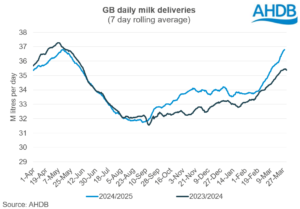
Denmark multi-national Arla Foods and GermanyŌĆÖs largest dairy co-operative DMK Group are set to merge, subject to approvals.
The new mega dairy ŌĆō which is set to eclipse the size of the proposed FrieslandCampina-Milcobel tie-up ŌĆō has a combined revenue of just under Ōé¼19bn (around $20bn).
The combined business would comprise 12,200 dairies ŌĆō 7,600 for Arla and DMKŌĆÖs 4,600 ŌĆō who produce around 25 million metric tons of milk in total.
The detailed merger proposal will be discussed with members of the cooperatives as well as relevant employee representatives in the coming months. It will then be submitted for approval to the cooperativesŌĆÖ Boards in June 2025.
Finally, the deal would require approval from regulators.
The deal is set to go before the Boards of both co-ops for approval and would also require regulatory approval.
What the leadership said
Jan Toft N├Ėrgaard, chair of Arla Foods, commented: ŌĆ£The foundation of this partnership is formed by our shared values, and I am immensely proud of this proposed merger, which is a win-win for our cooperatives.
ŌĆ£The strength of both Arla and DMK Group lies in our shared commitment to quality and innovation, and I see DMK Group as the perfect partner in shaping a new and strengthened Arla, poised to lead in the dairy industry.ŌĆØ
Heinz Korte, chair of DMK Group, added: ŌĆ£We are proud of the planned merger with Arla, a co-operative that shares our commitment to innovation and optimal value creation.
ŌĆ£This partnership strengthens the resilience of our cooperatives and significantly contributes to strengthening the competitiveness of our farmers.
ŌĆ£Together, we can expand our reach for our dairy products, thus improving our offering and jointly driving the further development of innovative products for the benefit of our members.ŌĆØ
Peder Tuborgh, CEO of Arla Foods, said: ŌĆ£DMK Group is the largest dairy cooperative in Germany and a very attractive partner that shares our core values. Our strong market positions and product portfolios complement each other very well and our strong partnership in recent years has proven that DMK Group is an ideal partner for Arla.
ŌĆ£Our joint market presence in Europe and globally will enable us to safeguard our production of healthy dairy products, ensuring stabile food production in Europe, as well as bringing even more nutritious products to the world and our customers.
ŌĆ£This merger is a natural continuation of our strong collaboration to the benefit of consumers, our farmers and their milk price.ŌĆØ
Ingo M├╝ller, CEO of DMK Group, added: ŌĆ£Arla has established itself as a key player in the dairy industry, and by partnering up we will have a strong and attractive branded and private label product portfolio for all our customers.
ŌĆ£Through ArlaŌĆÖs global reach we can access consumers and customers beyond our current geographical reach as well as strengthening our business resilience. Our complementary strengths, both in business and mindset, will enable us to keep advancing in dairy technology and innovation, while also providing a strong home for farmers.ŌĆØ
Consolidation is hotting up
The proposed merger is the latest sign that consolidation activity in EuropeŌĆÖs dairy sector is hotting up. It comes at a time when European milk production is stagnant to declining while global headwinds such as US tariffs on European dairy ŌĆō currently on hold ŌĆō threaten the long-term sustainability of the industry.
The proposed merger follows on from FrieslandCampina and MilcobelŌĆÖs announcement in December 2024. The two co-ops are still ironing out details on the proposed merger currently. There is a signed framework merger agreement and a detailed proposal is set to be finalized in H1 2025. The deal will then be put to a vote by stakeholders in both co-ops, and, finally submitted for regulatory approval.
When first announced, the proposed FrieslandCampina and Milcobel tie-up would have resulted in the largest European dairy co-operative, with 11,000 farmers, a combined revenue of Ōé¼14bn and a total milk volume of 10 million metric tons.
But if Arla and DMK merge, their combined dairy business would be the leader in revenue terms, supplier numbers and milk production volume.
DMK has more than 20 hubs across Germany, the Netherlands, Italy and at selected international hubs.
Arla meanwhile sources most of its milk from seven European countries: Denmark, Sweden, the UK, Germany, Belgium, the Netherlands and Luxembourg. The co-op also has an ingredients division, giving it a foothold into the specialized nutrition, active and performance segment. Arla and DMK also have a joint venture project, ArNoCo, which processes whey from DMKŌĆÖs cheese production into whey protein concentrate and lactose for ArlaŌĆÖs ingredients business.┬Ā
In its FY2024 annual report, the Danish co-op said it anticipated increased geopolitical turbulence and continued market volatility. ŌĆ£Navigating this will require careful strategic planning and adaptive measures,ŌĆØ Arla said.
Would the EU wave the deal through?
Before the Arla-DMK deal is formalized, the European Commission would have to assess its potential impact on competition in the bloc.
As such, the Commission would have to decide if the combined business would ŌĆśsignificantly impedeŌĆÖ effective competition in the EU.
According to EU merger regulations, ŌĆśproposed mergers may be prohibitedŌĆ”if the merging parties are major competitors or if the merger would otherwise significantly weaken effective competition in the market, in particular by creating or strengthening a dominant playerŌĆÖ.
In a nutshell, a business is said to hold a dominant position if it has substantial market power, e.g. more than 40%, or if there are low level of restraints on its ability to set prices, or other similar actions that could limit competition.
Also read ŌåÆ From the archive: Consolidation in US dairy
How much are 24.3 billion liters of milk?
Combined, the milk produced by Arla and DMK Group equates to nearly a quarter (23.68%) of the entire US fluid milk production for 2024 (102.66 million metric tons).
That volume would also fill 9,720 Olympic-sized swimming pools – and is nearly enough to fill CaliforniaŌĆÖs Lake Elsinore.




